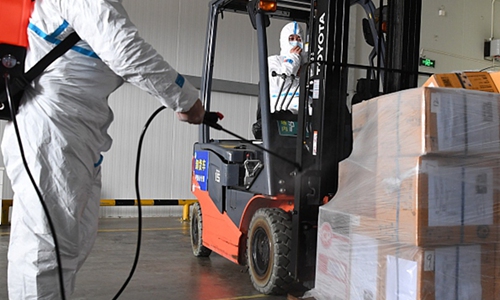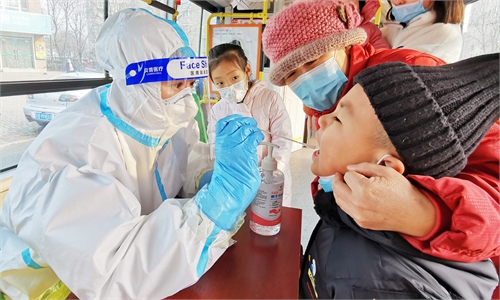Central working group aids NE China’s port city Dalian amid spiking cases of cold-chain related outbreak

cold chain Photo:VCG
A working group from the State Council, China's cabinet, led by the head of National Health Commission (NHC) reached Dalian to guide its third cold-chain related local outbreak, where 163 positive cases have been reported in a week.
As the latest epidemic flare-up that started in Northwestern China is easing, Northeast China Dalian's epidemic has seen a spike. Since the first case was detected on November 4, Dalian has reported 83 confirmed COVID-19 cases and 80 asymptomatic cases.
At a late meeting on Wednesday night, Ma Xiaowei, the head of the NHC who led the working group of the State Council joint anti-epidemic mechanism to Dalian, urged local authorities to contain the epidemic at the shortest time possible and minimize its impact on the society and livelihood of residents.
Ma said entrusted by Vice Premier Sun Chunlan, he went to Dalian to make an all-out effort to deal with the epidemic together with Dalian authorities, where the epidemic is still complicated and severe. Dalian is of great importance for the overall national anti-epidemic.
The first case was a 52-year-old man working at a cold-chain storage warehouse in Zhuanghe, a city administered by Dalian.
Dalian suspended operation of all imported cold-chain food related companies on November 8, according to the office of Dalian cold-chain food epidemic prevention and control leading group.
Data showed Dalian shoulders nearly one-third of the storage of cold-chain goods in China. The epidemic in Dalian is likely to impact the circulation of cold-chain food in the domestic market.
This is not the first time Dalian reported a cold-chain related epidemic. In July last year, the outbreak in Dalian was suspected to have originated in the processing workshop of Kaiyang Seafood Company. In December last year, the first infected people of the epidemic in Dalian Jinpu New Area were handlers of imported cold-chain food.
A public health expert who preferred not to be named told the Global Times that port cities had already strengthened epidemic prevention and control on imported cold-chain products. But cities like Dalian that handle much more imports and exports of cold-chain products, have a high risk of having coronavirus on those products.
An outbreak would occur if loopholes existed that would allow the virus to infect employees, the expert said.
Starting on Thursday, Zhuanghe in Dalian is about to roll out its second round of massive nucleic acid testing to screen out more potential infections.
Schools, including kindergartens, in Dalian have suspended classes. A student from Dalian University of Technology told the Global Times the campus was also sealed off on Wednesday and all off-line classes were replaced by online classes due to epidemic reasons.
Entrances of 36 toll stations of Dalian highway are closed, only vehicles for anti-epidemic use are allowed to pass. The other 16 toll stations in Dalian remain open but only people who possess green health QR codes, negative nucleic acid test results and a pass issued by local government can pass.
Different from previous outbreaks, half of the infections in the latest outbreak were people aged 50 and above, with underlying diseases such as high blood pressure, coronary heart disease and diabetes, Yang Rongli, a medical expert from Dalian anti-epidemic group, told Chinese media.


